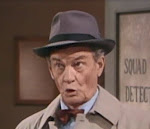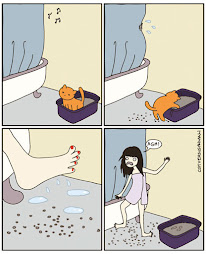Re-post from 2011.
I recently posted about ignorant characters. I point out problems with such characters. What I don't mention is how the ignorant character is often preferable to the noble, omniscient, triumphant, perfectly good or perfectly evil character.
The problem with the latter is how often filmmakers and authors do the equivalent of what Plinkett describes below--they make that noble, omniscient, triumphant, perfect character the focus of every prequel.
Giving the audience what the audience (supposedly) wants is a mistake.
* * *
In Plinkett's latest
Star Wars' review (which is amusing though not as complete as the others), Plinkett, like always, makes a very cogent point.
Here is the cogent point in my own words:
Just because Darth Vadar became an iconic image of Star Wars doesn't mean the prequels needed to be about him. Just because Darth Vadar is important to us doesn't mean he was important to that universe at that time.
There is a writing conundrum here. Yes, it helps when you are writing a novel/short story/movie/show to use motifs and plot-lines and characters that people actually enjoy and recognize.
However, if all you do is stick together the most common motifs/plot-lines/characters, 9 times out of 10, the product will be a dud--or, at least, remarkably lacking in staying power.
Plinkett does a thorough job proving that, unfortunately, this sticking-togetherness is how Lucas approached the prequels. He took iconic images from IV, V, and VI and simply expanded and rehashed those images in the prequels
even when the rehash made no sense.
So, for example, instead of the robe Obi-Wan was wearing in IV simply being the kind of robe people wear on desert planets, suddenly it became the robe ALL Jedi wear.
And instead of the training tools on Han Solo's ship simply being what was at hand, suddenly those tools became the way ALL Jedi are trained.
The result is unimaginative. And irrational.
It also highlights a very important principle. Classic motifs are good. Classic motifs backed by an actual vision are BETTER.
In a large, but not unmerited, segue, C.S. Lewis' Narnia series has been criticized for basically being a collection of every single fairytale/folktale/mythological image/motif C.S. Lewis encountered in the course of his extremely well-read life.
But as many critics, including Lisa Miller of The Magician's Book, have pointed out, it isn't the images and motifs that delight us, it is what Lewis did with them. He wasn't pretending to create new stuff; he was taking what he knew and rearranging it into a new pattern. He had a vision.
Every writer has to have a vision. Without the vision, the writing sags. And should the writer give up that vision to satisfy the audience's supposed desire for an iconic image, the audience will feel the vision dribbling away.
 |
| The writers did NOT make |
| Frasier a repeat of Cheers. |
Which is one reason why writing to satisfy fans doesn't always work. The fans LOVE a couple of minor characters, so the writer(s) make those characters a bigger part of the drama, and, hmm, what do you know, the show is less satisfying.
On the other hand, refusing to give the audience what the audience wants out of sheer "BUT I HAVE TO BE DIFFERENT" perversity isn't too smart either.
The solution is writers who give the audience what the audience wants without losing their vision. This, of course, isn't easy, but I see two solutions:
1. Writers can give the audience what the audience wants without losing their vision when they like what the audience likes.
If you want to write romance novels, it helps if you like romance novels.
2. Writers can give the audience what the audience wants without losing their vision when the writers and the audience agree on what the writers are trying to do.
To clarify this second point, not all novels/stories/movies/shows have to focus on the latest popular topic: vampires, for example. People vary; interests vary. There are a lot of audiences out there to satisfy. I would argue that people want much of the same thing within their separate genres, but that leaves a lot of room for individual creative vision-making.
Hey, there's even room for those people who think that reading stream-of-consciousness profundities about Life in Middle Class America is NEW and DIFFERENT! (Shhh, don't tell them they are being pandered to.) The point is, the writers and audience agree that that is what is going on.
In other words, the rules are agreed to--even when the rules are Monty-Python randomness.
Back to characters--the connection between this repost and characters is that giving the audience the characters they love as ALREADY those characters, despite the movie or book being a prequel, destroys the characters. I found Jill Paton Walsh's The Attenbury Emeralds a disappointment because it presented a young Wimsey as already ahead of everyone else in the mystery. There was no learning curve. He met Charles Parker but didn't learn from Parker, a policeman already.
In truth, I think filmmakers read into audience engagement something that isn't necessarily there. Yes, we like Gandalf's wise remarks to Pippin. We also like Gandalf's snappishness. And we like his confession to Galadriel that he is afraid. We like the noble, semi-omniscient bloke. But we like the imperfect, struggling bloke as well.
As my obnoxious (but accurate) fifteen-year-old self said,
"If everyone is special, then no one is special."
If there is no contrast between the character THEN and the character NOW, there is nothing for us to delight in.

 The imagined plan extends to the murderers' self-delusions. The groom resents his father-in-law's rejection of his completely ridiculous business proposals. The bride asks her stepmother to fetch nail polish that is already sitting on her vanity (she never bothered to check the set-up). They don't see their own arrests coming because they believe so thoroughly in their smug version of reality.
The imagined plan extends to the murderers' self-delusions. The groom resents his father-in-law's rejection of his completely ridiculous business proposals. The bride asks her stepmother to fetch nail polish that is already sitting on her vanity (she never bothered to check the set-up). They don't see their own arrests coming because they believe so thoroughly in their smug version of reality. 








































.JPG)







